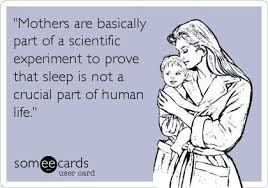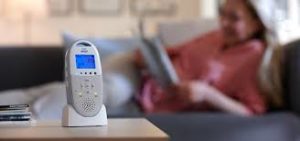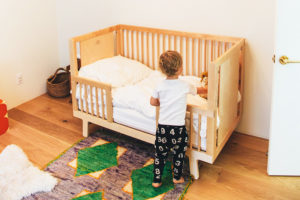 Sleep. I hadn’t experienced any consistent shut-eye in two years.
Sleep. I hadn’t experienced any consistent shut-eye in two years.
One night, I started ranting about it on Facebook. I was desperate for advice, answers–even just plain old empathy. I was DESPERATE. Little did I know that I would be hiring a sleep consultant the next morning.
Arielle Driscoll of Expect to Sleep Again Consulting, LLC messaged me that night on Facebook and said she could help. I admit I was skeptical at first, but she sensed my desperation and extended herself to truly get to know our situation. And in my grumpy, sleep-addled state, I was less than enthusiastic that Everett could handle any prescribed plan spelled out on a few sheets of paper. But I was pleasantly surprised.
[hr]

I typically stay out of sleep discussions unless someone asks for my advice. But when I saw Krysten’s plea and obvious struggle on Facebook, I had to reach out.
When I heard from Krysten, she made it clear that cry-it-out methods were probably the only way to address her son’s sleep issues. She was very convincing, so I quickly prepared a written plan for her to implement with Everett that night.
[hr]
We read the paperwork, which gave us sleep training options.
We tried “cry it out” (or extinction) initially; removing Everett from his crib to a mattress on the floor. With that, Everett tossed his stuffed animals and anything he could out of his crib. He banged on the door loudly and screamed until he fell asleep a few minutes later. Hours later, we opened the door to find a messy room and a toddler curled up in his rocking chair. Arielle came to our rescue with a new plan better suited to Everett’s needs.
[hr]

When I create a sleep plan, I rely on information shared by the parent(s) about their child.
Sometimes it becomes clear that perhaps the parent is misunderstanding their child’s behavior and/or needs, at which point it’s important to re-evaluate and adjust the plan. In Everett’s case, it became very clear to me that he had a fear of his crib. “Crying it out” was the opposite approach we needed to take with him. Each child is so different from the next when it comes to which method will work best. But in many cases, I do not feel that cry-it-out methods are effective, depending where a toddler is developmentally.
[hr]
Buoyed by the promise of sleep and the daily support of sleep consultant, I took Arielle’s advice and went to town.
 I bought a video monitor and removed the rocking chair from Everett’s room. We continued to place his crib mattress on the floor, but this time tried the “camping out” method. This requires a parent to sit and watch your child until he/she falls asleep. Arielle shared research with us that explains that sleeplessness does not occur in isolation; rather, other health issues often accompany sleep problems. Again, I sprang into action. We visited an allergist, an ENT, and a dermatologist. Turns out Everett is allergic to cats (hence an eczema rash that made him scratch at night) and has extra-large tonsils (which may impact his ability to breathe when he sleeps.) At the same time, the ENT discovered that my little guy’s ear infection had never quite gone away. Amazing how all of these health problems can impact sleep—but they do!
I bought a video monitor and removed the rocking chair from Everett’s room. We continued to place his crib mattress on the floor, but this time tried the “camping out” method. This requires a parent to sit and watch your child until he/she falls asleep. Arielle shared research with us that explains that sleeplessness does not occur in isolation; rather, other health issues often accompany sleep problems. Again, I sprang into action. We visited an allergist, an ENT, and a dermatologist. Turns out Everett is allergic to cats (hence an eczema rash that made him scratch at night) and has extra-large tonsils (which may impact his ability to breathe when he sleeps.) At the same time, the ENT discovered that my little guy’s ear infection had never quite gone away. Amazing how all of these health problems can impact sleep—but they do!
[hr]
As Krysten and I continued to chat daily about Everett’s sleep, it became clear that there were some health issues that were likely causing discomfort during the night.
My intake form includes a space for parents to share this information, but often parents are so sleep deprived that it doesn’t occur to them that eczema, large tonsils, or even developmental delays could be causing issues with their child’s sleep. Sleep is a biological function. We cannot survive without sleep just as we cannot survive without food or water. And in that same light, sleep or lack of sleep is absolutely intertwined with other biological functions, as well as both cognitive and physical developments. With this in mind, it’s important to understand that there is not one “formula” that works for all babies and children. Each child really has his own situation. Once I learned of Everett’s health issues, I encouraged Krysten to push her doctors for answers.
[hr]
The next step was to transition Everett to his toddler bed—which wasn’t such a big stretch, since it was just his crib mattress–elevated.
I also started trading bedtime duty with my husband when Everett could tolerate it. (My husband can’t be the only person able to put him down.) Everett still wakes up as often as two times a night, but he walks himself back to bed and falls asleep much more quickly. When he does wake up, it’s usually because he is coughing or wet. He walks out of his room, asks for Daddy, and usually goes right back to bed.
him down.) Everett still wakes up as often as two times a night, but he walks himself back to bed and falls asleep much more quickly. When he does wake up, it’s usually because he is coughing or wet. He walks out of his room, asks for Daddy, and usually goes right back to bed.
Bedtime is far from perfect, but six weeks into sleep training, we have enjoyed some pretty tangible benefits.
- We got our evenings back. No more waiting until 9 p.m. for the rocking to subside. No more eating dinner at 10 p.m. and getting absolutely nothing done. Also, Arielle suggested we put Everett down to bed earlier than our typical 8 p.m., which is too late for a two-year-old who wakes up at 6 a.m.
- We better understand our son’s fears around sleep. We weren’t sure WHY he wasn’t sleeping. Now we are pretty sure that he saw his crib as a “prison” and we concluded he also hates to fall asleep alone. Makes sense–at daycare, he has a little community of nappers surrounding him!
- We learned about some health issues we might not have otherwise explored so quickly. Although I suspected that Everett had some health issues that interfered with sleep, Arielle’s support prompted me to push our pediatrician for allergy testing and referrals.
- We transitioned from a crib to a toddler bed naturally, with little drama. The move was inevitable, but it helped to have a plan in place rather than wonder if we were making the right move.
- We stopped wasting our time with methods that didn’t work. Folks mean well, and maybe “the family bed” works for some, but it helped us to have access to research-based methods and an expert who could tell us what we were and were not doing right to facilitate sleep. We cut off the TV in the evenings and made sure that Everett had more wind-down time.
[hr]
Everett has made a lot of sleep progress, and I am beyond happy for Krysten and her family.
Working on your child’s sleep issues is typically not a “quick fix.” There is no magic wand or magic formula for every child to sleep well. It’s an ongoing commitment to keep things on track for child as he changes and grows each day. When I work with families, I truly partner with them to understand their child’s specific needs. I will help you build a tool box so that you know how to handle your child’s sleep in any given situation in a way that is best suited for him.
Want to partner with me? It would be an honor to help improve your child’s sleep, health, and wellness.











Another fine and informative article. I hope other parents out there will benefit from your positive experience.
Comments are closed.